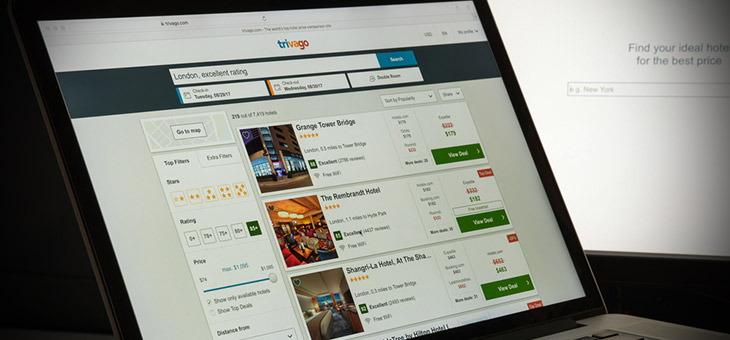The Australian Competition and Consumer Commission (ACCC) is putting the blowtorch to the online travel booking industry, and has instituted proceedings against hotel booking giant Trivago for misleading and deceiving customers.
The ACCC is taking Trivago to the Federal Court, alleging it made misleading claims about pricing in its television advertising campaign and on its website, breaching Australian Consumer Law.
The watchdog has taken exception to Trivago’s TV and web advertisements, on which the hotel price comparison service claims to be impartial and objective, allowing customers to find the cheapest prices for rooms.
However, it was recently revealed that Trivago prioritised advertisers that paid the highest cost per click fee to Trivago.
Trivago’s main source of revenue is the cost-per-click payments it receives, where advertisers are charged a fee each time a user clicks on one of their offers.
Trivago aggregates deals offered by online travel sites such as Expedia and Hotels.com, as well as from proprietors themselves, then highlights the one price out of all their advertisers that is supposed to be the best deal.
“Based on Trivago’s highlighted price display on its website, we allege that consumers may have formed the incorrect impression that Trivago’s highlighted deals were the best price they could get at a particular hotel, when that was not the case. Trivago based its rankings on the highest cost per click it would receive from its advertisers,” said ACCC Chair Rod Sims.
“We allege that because of the design of Trivago’s website and representations made, consumers were denied a genuine choice about choosing a hotel deal, by making choices based on this misleading impression created by the Trivago website.”
The ACCC also alleges that Trivago’s price comparisons were misleading because they often compared a standard room price with a luxury room price at the same hotel, creating a false impression of savings offered for the standard room.
“We also allege that by not making genuine room price comparisons, consumers would likely have paid more than they otherwise would have for the same hotel. Further, hotels may have lost potential business as a result of this alleged conduct,” said Mr Sims.
ACCC’s investigation revealed that Trivago users overwhelmingly clicked the highlighted offers for each hotel.
“This case highlights growing concerns the ACCC has in relation to comparison platforms, and on how algorithms present search results to consumers,” said Mr Sims.
“We are very concerned that such platforms convey an impression that their services are designed to benefit consumers when, in fact, listings are based on which supplier pays the most to the platform.
“Businesses must ensure the nature of search results – such as, if they are sponsored or paid for – is made clear to consumers or they risk contravening the Australian Consumer Law.”
Have you used Trivago? Which online comparison sites do you use? Do you trust them?
Related articles:
Travel agents vs online bookings
Hotel cheats TripAdvisor ratings
Hotel staff to review guests

